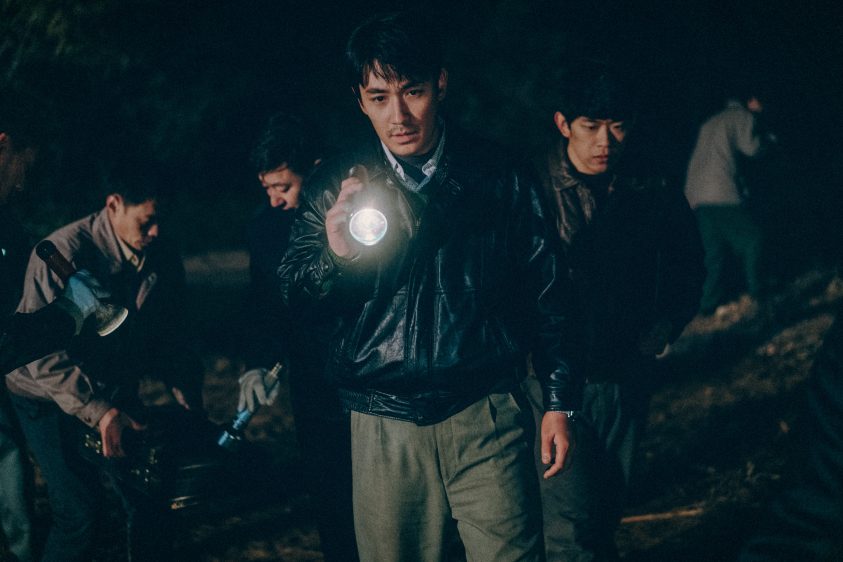
Imagine the gleaming surfaces of Park Chan-wook’s terrific “Decision to Leave” stripped of romance, all scuzzed-up and grimy. Imagine drilling down through Diao Yinan’s Berlin-winning “Black Coal, Thin Ice” and finding unexpected seams of absurdist dark comedy. You are now somewhere in the seamy offbeat world of “Only the River Flows,” director Wei Shujun’s inventive riff on Asian-noir that gives the expanding subgenre something its Chinese contributions often lack: a pitch-black sense of humor.
Wei has been laying claim to the title of laid-back joker in China’s new-gen pack since debuting with affable slacker comedy “Striding into the Wind” in 2020 (a selection in 2020’s canceled Cannes festival) and following it up with autoreflexive filmmaking satire “Ripples of Life.” Now he brings his wry sensibilities to bear on this murdery mindbender, which he adapts, with a healthy disdain for boring stuff like “linear plotting” and “resolution,” alongside Kang Chunlei, from a short story by postmodernist author Yu Hua.
Like the greatest genre exponent, Raymond Chandler, Wei cares less about logistics than about mood. And so his rainy, grainy movie (DP Chengma shoots on film in low light, giving the images a lovely dirty texture) looks and feels as hardboiled as its hero: a tattered idealist trapped in the amber of circumstance and character, struggling futilely against a fate that lies in wait for him like a knife-wielding maniac.
A portentous opening title quotes Albert Camus: “I have made myself destiny. I have assumed the foolish and incomprehensible face of the Gods.” But handsome, cynical police detective Ma Zhe (Yilong Zhu) doesn’t look especially foolish and his face more closely resembles Gregory Peck’s. It’s the early 1990s (which lends the film a cool retro vibe), in rural Banpo Town. And as we’ve just seen in a schlocky Brian De Palma-style opening, complete with victim turning to the camera as the shadow of the assailant bears down, a woman has just been killed at the river’s edge. Known only, with droll Chinese pragmatism, as Granny Four, the woman was something of a recluse, but had recently taken under her wing a homeless local, bluntly nicknamed “Madman” (Kang Chunlei). It’s not hard to guess where suspicion for the slaying immediately lies.
But there are other clues, notably a handbag found near the body that contains a cassette tape of music, eventually discovered to have a recorded voice message hidden in one of the tracks. Through clever detective work — and there is enough of this to suggest Ma Zhe is pretty good at his job, even if his boss is more interested in ping-pong and his callow junior officers are distracted by internecine flirtations — they trace the source of the voice to a young woman having a covert affair with a poetry teacher. He in turn leads them to a local hairdresser (Wang Jianyu), who complicates matters with a sudden confession. Meanwhile the parallel pursuit of Madman starts to have odd echoes in Ma’s own life, as his pregnant wife Bai Jie (Chloe Maayan) discovers their unborn baby has a genetic disorder that may lead to mental disability.
Witnesses and suspects multiply and dwindle, through further murders, suicides and disappearances, and Ma’s hold on reality starts to falter. There’s a police-school certificate he cannot find and a jigsaw puzzle he sabotages that is somehow completed. Beethoven’s “Moonlight Sonata” plays so often on the soundtrack that it starts to feel like the movie has an earworm. And there are maddening glimpses of Madman, who becomes an avatar for this whole elusive film in being ridiculous and inexplicable and forever just out of reach, turning down some inky alleyway just up ahead, and disappearing. Those who like their mysteries clearly solved, beware.
Were it not for the sly, eccentric wit that Wei brings to the edges of almost every scene, the moral and literal murkiness might become simply too impenetrable to bear. But humanizing quirks and flourishes abound, providing whatever profundity this rather touchingly melancholic portrait of small-town desperation can muster. Each character is revealed to be their own little rabbit hole of inconsistencies and personal tragedies that may have everything or nothing at all to do with the murders. Everyone has secrets, some silly, some sinister, but mostly just sad: little scabbed-over scratches on these lonely Chinese hearts.













